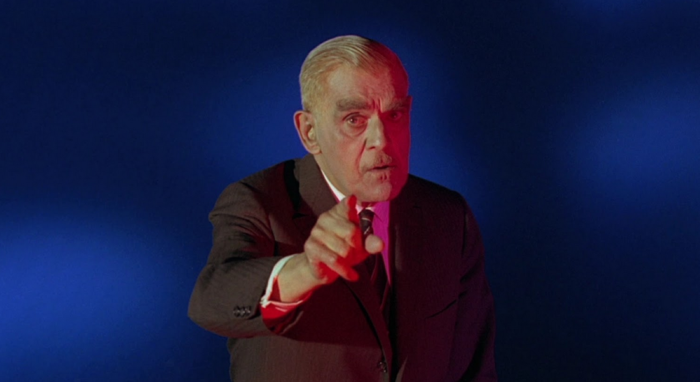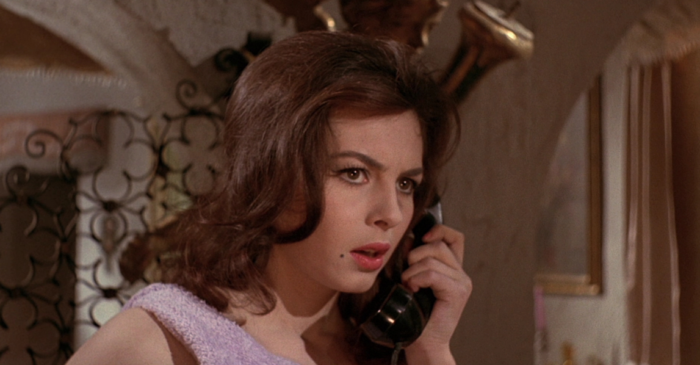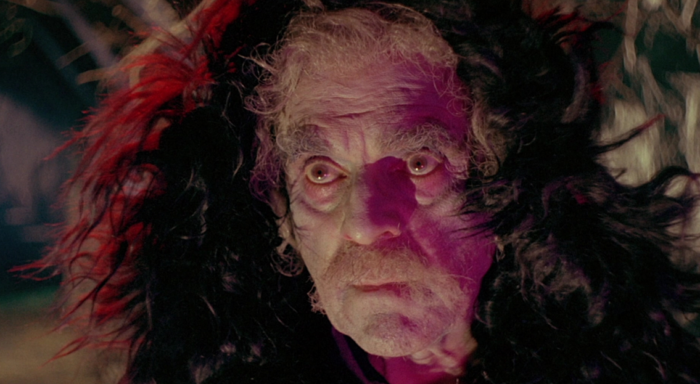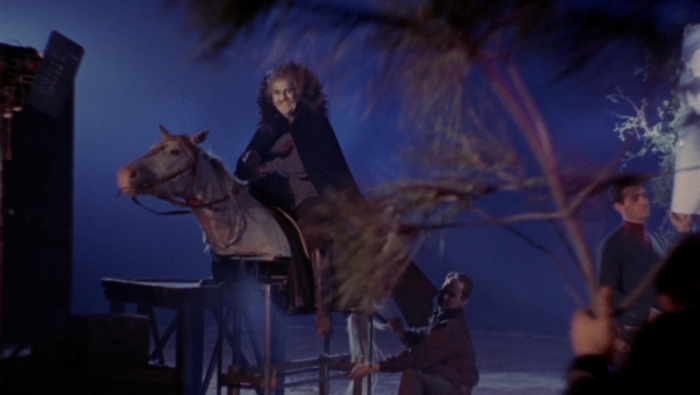
This movie is metal as fuck. I mean it must be, right? If not for this film we wouldn’t have the greatest metal band of all time. Birmingham’s best would still be “Earth” and everyone knows the Earth is not metal. Except that it is 35% iron, 15% silicon, and 13% magnesium, but it doesn’t rock. Though it is a rock, but I digress.
So why did Earth become Black Sabbath? The band had their pick of the litter of badass Mario Bava titles; Black Sunday, Blood and Black Lace, Planet of the Vampires. The story goes the band saw Black Sabbath playing on a marquee across the street, noticed more people were seeing the movie than their show and thus changed their name to Black Sabbath, and thank Satan they did. Black Sabbath is one of the best band names on the face of this non-metal Earth. There’s a classiness to the word “Sabbath” and yet it feels gothic and evil. Like a Holiday for demons. In fact, the name is so good it’s actually better than the movie it’s attached too.
I haven’t seen a lot of Bava’s filmography but after three films I’m getting a feel for Italy’s B-Movie Maestro. Colin reviewed Bava’s best film, Black Sunday, yesterday. Black Sunday is a stark and beautiful piece of gothic cinema—Fun Fact: Bava was often his own cinematographer. I’ve also seen Bava’s 1971 proto-slasher A Bay of Blood, which is often considered Bava’s second most pivotal film. Black Sabbath sits somewhere in the middle. It’s not as stunning as Black Sunday nor as explicit as A Bay of Blood. It’s a posh anthology film with a slight edge but no real bite. There’s a made-for-TV quality that makes the whole experience feel like an episode of Night Gallery. So is it any good?
The film opens with none other than horror legend Boris Karloff speaking to the audience in a horror netherworld. Karloff tries to amp you up telling you to “come closer” and prepare to watch the scariest thing ever made. It’s a great idea if not for the fact this film did the unspeakable and dubbed over Karloff in Italian. How dare they rob an audience of Karloff’s ghastly dulcet tones. This is the Grinch we’re talking about!
The film contains three segments inspired by such legendary writers as Tolstoy and Chekov. The first, called “The Telephone” concerns a French call-girl named Rosy (Michèle Mercier) who receives a series of threatening phone calls. The caller eventually reveals himself as Rosy’s former pimp Frank (Milo Quesada) who blames her testimony for sending him to prison. Frank also informs Rosy that he’s escaped and coming for her. Rosy is convinced to stay with her estranged friend Mary (Lidia Alfonsi) and hides out. Twist, Mary was faking the Frank calls to rekindle her friendship with Mary… somehow, but then UH OH Frank does show up anyways and kills Mary. Rosy stabs Frank to death and she has a mental breakdown.
The story starts strong with the mystery of the phone calls. Where the story goes off the rails is trying to pull off its ridiculous twist. I don’t buy Mary’s motivation and the short ends in a dumb coincidence. The short is shot nicely—as all the segments are thanks to Bava and Ubaldo Terzano—but I don’t know why anyone would pick this story when there are so many great horror short stories out in the ether.
The second segment is the film’s most notable “The Wurdalak”. Notable not only for being the most traditional monster story but also because it stars Karloff himself—still dubbed, unfortunately. Set in 19th century Russia, a young nobleman named Vladimir (Mark Damon) arrives in a small village and finds a decapitated corpse with a knife plunged in its chest. Vladimir takes shelter with a family in their cottage and learns the corpse was believed to be that of a “Wurdalak” which is what vampires are called in Slavic folklore. Not only that but the family patriarch, Gorca (Boris Karloff), is a Wurdalak slayer out on a hunt.
Gorca arrives well after dark, disheveled with a mad look in his eyes. Turns out, you guessed it, he’s become a Wurdalak and goes after Vladimir and his own family, turning them into Wurdalaks. Taking place in old Europe, the segment has a memorable look. That being said it’s hard to ignore the fact its all on sound stages. Regardless it’s solid entertainment. There’s nothing too surprising or unique but its dumb fun in the way Night Gallery is dumb fun.
The final segment is often considered the best. Set in Victorian London “The Drop of Water” is about a nurse named Helen (Jacqueline Pierreux) who steals a ring off a corpse. In the process, she knocks over a glass, leaving behind an infernal dripping noise that haunts her through the rest of the story. Helen returns home and proceeds to be assailed by a cacophony of mysterious disturbances. The lights go out in her apartment, she is pestered by an incessant fly, and eventually sees the corpse of the woman she stole the ring from and strangles herself. It’s a creepy slow burn. Again, well done but nothing that hasn’t been done better in any issue of Tales from the Crypt. The film ends with a closing monologue from Italian Boris Karloff on a horse and the camera pulls out to see he’s on a film set. Not sure why that’s in the film but it is.
If it sounds like I’m being hard on Black Sabbath it’s only because I’m such a fan of anthology horror. I devoured EC comics reprints as a kid, downloaded more issues of Creep magazine onto my Kindle than actual books, and continue to binge anthology horror shows like The Twilight Zone and Tales from the Darkside to this day. If I’ve learned anything it’s that a short horror story lives and dies by its twist ending. Something dark and ironic to really leave you with something to think about. I didn’t get that from Black Sabbath.
Black Sabbath does a decent job building up these stories but the ending always feels like an afterthought. Like Goosebumps. Alternatively, there was another studio in Europe that produced much edgier anthology horror films not much later. I’m of course talking about the British production company Amicus that gave us such classics as Asylum (1972), From Beyond the Grave (1974), and the excellent Tales from the Crypt (1972). Which Colin reviewed on a previous Shocktober. Those shorts were violent, edgy, and dark as shit. This not so much.
I appreciate the craft behind Black Sabbath. The film looks, feels, and sounds great. But I found it very easy to tune out and never felt unsettled. I’m not even sure if this movie is as scary as the band Black Sabbath. I mean, have you heard “The Wizard”? If that doesn’t make you afraid of wizards I don’t know what will.
‘Twas all an illusion!





